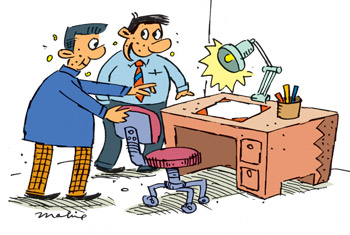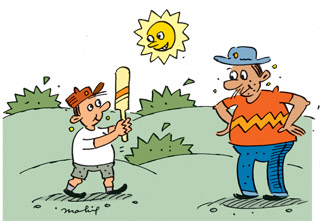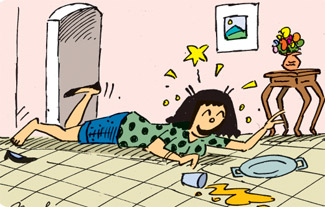|
 by R. S. Karunaratne
by R. S. Karunaratne
Use ‘place’
in the right context
‘Place’ is a countable noun meaning a particular position, building,
town or village.
1. ‘Place’ is used to talk about where something goes, or about where
someone lives.
When you go to the library put the books in the right place.
|

This is the place I usually
sit. |
Can you come to my place?
I will meet you at any place you suggest.
He goes from place to place selling sweets.
You’re living in a nice place.
2. ‘Place’ is used to talk about where you do things.
I am looking for a place to play cricket.
Oh, now you’re looking for a place to eat.
This is the best place to buy school books.
I know a place where they foretell your future.
What is the best place to have a hair-cut?
3. ‘Place’ is used to identify a place.
This is the place I usually sit.
Did you find the place to park your car?
Have you visited Shakespeare’s birth place?
What’s that place you went to buy spectacles?
It is the same place we stayed last year.
4. ‘Place’ can be combined with many verbs.
Where will the exhibition take pl
ace?
The festival takes place every other year.
Take your place and wait for me.
She will get a place at the university.
Keep a place for me as I’m coming late.
You go back to your place and stop quarrelling.
|

I am looking for a place to
play cricket. |
Shall we change places?
5. The following adjectives and nouns are usually used before ‘place’
This is a good place to live.
Harvard University is the best place to do your degree.
Is this a safe place to bathe?
I always go to the right place to get my things done.
Sorry, you’ve come to the wrong place.
Bandarawela is a nice place to spend your holiday.
This is a busy place with a lot of people working round the clock.
It is a quiet place to have our meals.
We were stranded in a strange place.
Don’t smoke, this is a public place.
This hotel is a meeting place for lawyers.
The thieves went into their hiding place.
Shall we go to the market place?
6. ‘Place’, when used as a verb is followed by certain nouns.
I have placed an order for the book.
I am going to place an advertisement in the Sunday Observer.
They have placed an ad in the local newspaper. (Abbreviation)
7. Set phrases
A five-year plan is in place for the development of the country.
What made you to follow a course in psychology in the first place?
(The beginning of a situation.)
Some tourists travel all over the place when they visit the island.
(in many different places)
I think your comments are out of place. (inappropriate)
Chicago is no place to bring up children. (not an appropriate place)
How are you placed on Sunday? (are you available)
-----------
Know your idioms
Idiomatic expressions are forceful,
vivid and brief. They are the most difficult part of the language.
Here are some commonly used English
idioms with three possible meanings set against each idiom. Tick off
(a), (b) or (c) which you think is nearest in meaning to the given
idiom. Check your answers with the key.
1. He was born under a lucky star.
(a) to be continually lucky
(b) born into a rich family
(c) governed by Jupiter
2. They are at daggers drawn.
(a) fighting in a battle.
(b) Fighting with swords
(c) enemies
3. He said that his employer passed him over for promotion.
(a) ran away
(b) avoided
(c) concentrated
4. When he goes to a party he drinks like a fish.
(a) drinks large quantities of alcohol
(b) drinks a lot of water
(c) drinks water very fast
5. Can you run like a hare?
(a) hop and run
(b) run slowly
(c) run very fast
6. She had a bad quarter of an hour at the hospital.
(a) an unpleasant time or experience.
(b) an eventful time
(c) a busy time
7. She refused to go on a blind date.
(a) to meet an old friend
(b) to meet someone unexpectedly
(c) to meet someone you do not know
8. He used to have a nightcap every day.
(a) an alcoholic drink taken before going to bed
(b) a cap worn at night
(c) a minor quarrel
9. Don’t egg him on!
(a) throw eggs at somebody
(b) encourage
(c) humiliate
10. He was only a sleeping partner in the company.
(a) inactive business partner
(b) somebody who keeps company
(c) business partner who is very active.
-----******
Key
1. (a), 2 (c), 3 (b), 4 (a), 5 (c), 6 (a), 7 (c), 8 (a), 9 (b), 10
(a).
-----*******
-----------
Starters
Use ‘a’,
‘an’, ‘the’
meaningfully
‘A’ and ‘an’ are indefinite articles. ‘The’ is the definite article.
‘A’ is used before words beginning with a consonant sound. By now you
know the vowels: a, e, i, o, u. All the rest are consonants.
I had a sandwich for breakfast.
Do you have a pen?
I am a boy, but you are a girl.
|

She slipped on the floor. |
Do you like to have a cup of coffee?
I write with a pencil.
‘An’ is used before words beginning with a vowel sound.
He carries an umbrella wherever he goes.
Do you know my uncle? He is an engineer.
The hen laid an egg.
An apple a day keeps the doctor away.
There is an owl on the branch.
We use ‘the’ when we are thinking of one particular thing.
Sam sat down on the chair.
Did you get the job you applied for?
Dad cleaned the car yesterday. (His car)
We use ‘the’ when it is clear in the situation which thing or person
we mean.
The fan is hanging on the ceiling.
She slipped on the floor.
Please turn off the light.
I took a trishaw to the station.
Could I speak to the manager, please?
I am going to the bank and the post office.
Sorry, mother has gone to the doctor. (her usual doctor)
With great reluctance she went to the dentist.
My eldest brother is in the Army.
His father is in the Navy.
Activity
Put in a / an / the in the blanks.
1. This morning she bought ..... newspaper.
2. ..... newspaper cost her Rs. 20.
3. I saw ..... accident this evening.
4. They live in ..... old house by the sea.
5. We still live in ..... small village.
6. Do you like to have ..... garden like this?
7. It’s a beautiful morning. Let’s sit in ..... garden.
8. Can you recommend ..... good doctor?
9. We had lunch in ..... most expensive hotel.
10. What’s ..... name of that boy you met yesterday?
*******
Key
1. a, 2. The, 3. an, 4. an, 5. a, 6. a, 7. the, 8. a, 9. the, 10.
the.
*******
----------
Let’s make a word triangle
Here is an interesting word game for starters. Follow the clues and
fill the grid accordingly. You may use a standard dictionary to find the
words. Check your answers with the key and enjoy the word game.
Clues
1. The eighth letter in the alphabet
2. Used to express surprise, joy or suspicion
3. An ugly or evil old woman
4. A person paid to do hard and often boring work
5. Having much hair
6. A style or process of arranging a woman’s hair
7. A bent pin for keeping long hair in position on the head
8. A distinctive feature
9. A condition in which the breath smells unpleasant
******
Key
1. H 2. HA 3. HAG 4. HACK 5. HAIRY 6. HAIRDO 7. HAIRPIN 8. HALLMARK
9. HALITOSIS
****** |

